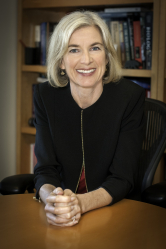Media
HKU to confer honorary degree upon internationally acclaimed scientist
Professor Jennifer A Doudna
24 Nov 2017
The University of Hong Kong (HKU) will confer an honorary degree upon internationally acclaimed scientist Professor Jennifer A Doudna at the Li Ka Shing Faculty of Medicine session of the 198th Congregation to be held on December 17, 2017 (Sunday).
Honorary Degrees are awarded to individuals in recognition of their distinguished service and commitment to the University, the community, and to academia. They are also conferred to those who have made valuable intellectual, social and cultural contributions to society and the world.
The President and Vice-Chancellor, Professor Peter Mathieson will preside over the Congregation session.
Details as follows:
Date: December 17, 2017 (Sunday)
Time: 1pm – 5pm
Venue: Hall 3DE, Hong Kong Convention & Exhibition Centre, Wan Chai
Biography
Jennifer A DOUDNA
Doctor of Science honoris causa
Professor Jennifer A Doudna is a Professor of Molecular and Cell Biology and Chemistry at the University of California, Berkeley, where she holds the Li Ka Shing Chancellor’s Chair in Biomedical and Health Sciences, and is an Investigator at the Howard Hughes Medical Institute. She holds a Bachelor of Arts degree in Chemistry from Pomona College and a PhD from Harvard University.
Professor Doudna has been a leading figure in what is often referred to as the ‘CRISPR Revolution’ and she is renowned for pioneering a simple way of editing the DNA of any organism using an RNA-guided protein found in bacteria.
Her research sought to understand how RNA molecules controlled the expression of genetic information, which led to insights about CRISPR-Cas9-mediated bacterial immunity. In 2012, Professor Doudna and her colleagues made a discovery that relied on a protein named Cas9 found in the Streptococcus bacteria CRISPR immune system that worked like scissors. The protein attacks its prey, the DNA of viruses, and slices it up. This technology – precision ‘DNA scissors’ called CRISPR-Cas9 – could be used for efficient genome editing in animals and plants, and has exploded in popularity since it was first published and is revolutionising genetics, molecular biology and medicine.
Worldwide, researchers are using Cas9 to investigate the genetic roots of problems as diverse as sickle cell anemia, diabetes, cystic fibrosis, AIDS and depression, in the hopes of finding new drug targets. Others are adapting the technology to re-engineer yeast to produce biofuels and wheat that can withstand pests and drought.
Professor Doudna is a member of the National Academy of Sciences, the National Academy of Medicine, the National Academy of Inventors and the American Academy of Arts and Sciences. She is also a Foreign Member of the Royal Society, and has received many other honors including the Breakthrough Prize in Life Sciences, the Heineken Prize, the BBVA Foundation Frontiers of Knowledge Award and the Japan Prize.
In recognition of her contributions to medicine, society and the world, the University has resolved to confer upon her the degree of Doctor of Science honoris causa.
For details of the background of the honorary graduand, please visit: https://www4.hku.hk/hongrads/
For media enquiries, please contact: Ms Trinni Choy (Assistant Director (Media), Communications and Public Affairs Office) tel: 2859 2606 email: pychoy@hku.hk; or Ms Melanie Wan (Senior Manager (Media), Communications and Public Affairs Office) tel: 2859 2600 email: melwkwan@hku.hk.

